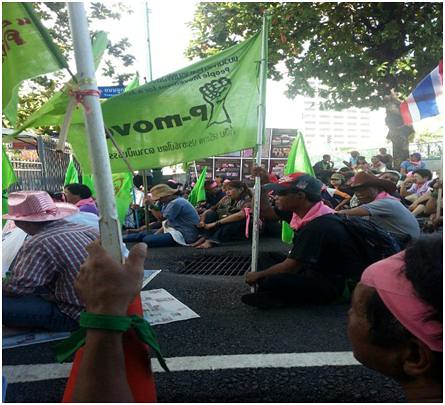They're back on the streets again...this time holding "green" flags and "fists" as their symbol. The reborn sections of the Assembly of the Poor and former Yellow Shirts have learned expensive lessons from their share in the color-coded conflict: never forsake you own grievances for some lofty political gains.

(Credit: P-Move Facebook)
Is this a resurgence of true people's politics?
Or is this old stuff in a new bottle?
The People's Movement for Just Society, or "P-Move," took to the streets beginning on May 6 to call for Yingluck government's attention on decades-old problems of inequality, poverty and injustice. The 4-Region Slum Network, Assembly of the Poor's Pak Mun Dam, Land Reform Network, and Community Network for Social and Political Reform took the lead in their march to Government House while
thousands more joined in over the following week. They came for the sole purpose of getting their voices heard at the next cabinet meeting on May 15.
"We, the urban poor, the farmers and others in the agricultural sector have been gravely disaffected by the country's uneven development and unequal access to resources. We are never given the chance to improve our livelihood or reach our potential. It's not because we're lazy. We were just not given the opportunity. The only way to make a just, more equal society is to provide equal access to resources,"
proclaimed a P-Move leader.
Their 19-point policy
recommendation includes broad issues such as reforming the state, the power structure and the justice system. Other more specific demands include the issue of land ownership, dams, and natural disaster funds. Emergency
issues that need immediate attention are temporary protection for those soon to be issued land title deeds, Pak Mun Dam, land bank and sustainable housing project. While this laundry list of demands seems all too familiar to those who have followed grassroots and NGO movements in the past two decades, such renewed mobilization underscores the stubborn persistence of these problems.
Despite a "
promise" from the government, P-Move was hung out to dry (again) as none of their issues were brought to the table at the cabinet's meeting. Yingluck also
warned P-Move protesters, some of whom are in Chiang Mai, not to stage protest rallies near the upcoming Asia-Pacific Water Summit to be held at a newly minted Convention Center in the northern province.
Direk Kong-ngeun, a representative from the Federation of Northern Region Farmers and a community leader in Ban Pong, Chiang Mai, ushered his disappointment with the government's unwillingness to consider their concerns. Direk, who himself was being charged for trespassing "private property,"
vowed to fight til the end. "If I were to be jailed to set an example, I would be willing to. If I could create salience for the issue of landlessness and raise awareness about the poor then be it."
The faces at the P-Move rallies are too familiar. Some of the same groups joined the People's Alliance for Democracy (PAD) - or the Yellow Shirts - to oust Thaksin since 2006. The 4- Region Slum Network, whose late leader - Suwit Watnoo - became part of the PAD's leadership was among the forefront of the renewed mobilization. Other anti-Thaksin groups, such as the Assembly of the Poor, was also prominent. Sulak Sivaraksa, the AOP's de facto leader (phoo yai) gave a speech on stage encouraging this grassroots movement to fight for the people.
This re-mobilization of the people's sector indeed has two main implications. First, P-Move seeks to differentiate itself from the highly politicized color-coded movements of the Red and Yellow Shirts. It aims to rebrand its image as the "real" grassroots movement whose foundation rests on the true problems of the poor. They implicitly acknowledged the mistakes they made for joining the Yellow Shirts and allowed other groups with vested interests to "steal" their voices for their own political gains. By so doing, P-Move also admitted that forming alliances with other unlike-minded groups was ineffective. They needed, in essence, to break away from the "yellow" color and go back to basic.
P-Move also seeks to situate themselves as separate from the Red Shirts. The Red Shirts are not the "de facto" grassroots movement that seeks to help the poor. By raising their green flags and holding protest banners against the Yingluck government, they made clear that they are the ones really fighting for the poor and the disadvantaged. The struggle against the unjust and highly unequal system is about community rights and access to resources, not political amnesty for Thaksin nor a fight with the Constitutional Court. The real voices of the people at the bottom are not ones tied to a political party.
While part of the Yellow Shirt media
took credit for this new round of protests, P-Move needs to stay firm on their own grounds if they were to be taken seriously. Given the tarnished leadership for some of the groups having been involved with the Yellow Shirts, it's going to take the Yingluck government and the public some convincing that this movement is not about the current political conflict.
###
Aim is a Doctoral Candidate in Political Science at the University of British Columbia. She is also a Liu Scholar, an Associate of Institute of Asian Research and a Fellow at Thammasat University.


